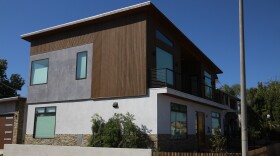Google and city officials announced Thursday that they're going to explore bringing an ultra high-speed broadband network to San Diego.
The Silicon Valley-based high-tech giant will conduct a study of factors that affect construction of its Google Fiber networks, such as local topography, housing density and the condition of existing infrastructure.
At the same time, city officials will complete a checklist of items — like providing a map of utility lines — that will prepare for a large-scale fiber build.
"Information is power, and the more we connect San Diego to super-fast Internet, the stronger our neighborhoods and economy will be," Mayor Kevin Faulconer said.
"We don't just want modern infrastructure — we also want it smarter, faster and more accessible to San Diego families and businesses," Faulconer said. "This is part of an ongoing effort to lay the foundation for our local economy and community to compete and thrive in the 21st century."
Faulconer and Google made the announcement in Barrio Logan, saying they want to increase Internet access for everyone in the city.
"The idea is, really, helping to bridge the digital divide and to bring high-speed Internet to every single neighborhood," Faulconer said.
Today's average American broadband speed is 11.9 megabits per second, but the gigabit Internet services available via Google fiber can offer up to 1,000 megabits per second — or up to 40 times faster than basic broadband, according to the city.
Jill Szuchmacher, director of expansion for Google Fiber, said the number of Americans signing up for gigabit Internet is growing by 480 percent a year.
"Abundant high-speed Internet can help communities grow stronger, establishing a groundwork for innovation and economic growth," Szuchmacher said.
Szuchmacher said Google Fiber's gigabyte connection currently costs $70 a month. Including TV service, the cost is $130 a month.
The mayor's office said if it's determined the project can move forward, Google Fiber will design the network, which would follow a hub-and-spoke design where the city would be encircled with a ring of fiber cables that branch off into neighborhoods, homes and businesses.
Construction would entail stringing and laying thousands of miles of state-of-the-art fiber optic cable, followed by a gradual roll-out of service to the city.
"We are very excited by the proposed Google Fiber project," said Ray King, president and CEO of the Urban League of San Diego County. "It would open new venues and pathways for connecting disadvantaged neighborhoods and communities to the innovation economy through employment, new electronic business platforms and digital learning."
Google Fiber networks operate in Austin, Kansas City and Provo, Utah, and will be rolled out soon in Atlanta, Charlotte, Nashville, Raleigh-Durham, Salt Lake City and San Antonio.
In addition to San Diego, Google is studying Irvine, Louisville, Phoenix, Portland and San Jose for possible fiber networks.





